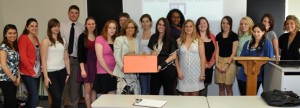By Kaitlyn Boisvert –
For social workers, happiness and gratification can come in small, unexpected yet beautiful places. It can perhaps take presence in a moment where a homeless patron smiles in gratitude upon receiving a meal or when a child can find the faith and courage to laugh again after encountering misfortune and grief. It is a practice that encourages kinship, working together, and receiving gratification from helping others.
“Helping to make this world a better place especially for the most vulnerable among us is what makes social work matter,” said Sister Johnelle Luciani, the department’s chair. “The strength-based approach of the social work profession, as well as the privilege of working with diverse client populations on issues they are confronting, is what attracted me to pursue advanced degrees in social work.”
Members of the department express deep devotion towards fulfilling such a philosophy. According to the Salve Regina University website, instructors have experience in service and charity and teach a variety of classes that range from human behavior to social welfare policies. Classes are described as small, yet impactful, as they are led by instructors who are passionate for the subject and help enlighten students to many realities of the world.
Yet the study of social work is not just limited to the classroom, as the very definition of social work itself encourages action to be taken for the sake of those in need.
As a requirement, students are expected to complete almost 700 hours worth of community service, and juniors and seniors are required to participate in service-devoted internships in both their junior and senior year. These internships vary, from hospitals and adoption centers to residential group homes and shelters.
Senior Sagitta Woodsman, a social work major, volunteered at a women’s shelter and completed her internship at the International Institute, where she worked with newly arrived refugees. This year she is interning with youths in out-of-home placements, where she works to connect them with positive adult mentors.
“I transferred to Salve Regina my sophomore year because the school has an excellent social work department,” said Woodsman. “It is based on social justice and empowerment. Assisting oppressed populations to reach those basic values is vital in my practice.”
One proud accomplishment of the department is that 94 percent of students pursue graduate studies in social work with advanced standing, which allows them to complete their degree a year early.
Another impressive percentage of students find jobs after completing their studies, which assures students that they can further pursue their devotion to service and kinship after graduation. “Currently, our graduates find positions rather quickly,” said Dr. Barbara Sylvia, a social work faculty member. “Many locate jobs in their area of choice, whether it be working with children, adults, families, those with developmental disabilities or the elderly.”
The future outlook of social work is also bright as the next decade is believed to bring an influx of success and new opportunities to social work majors. In 2010, the Bureau of Labor Statistics predicted that social work positions are projected to increase by over 50 percent by 2020.
Sophomore Anneka Vanderveen is one of these students, who has her heart set out on improving the lives of children in foster homes.
“For most of my life, I’ve been around foster children, and I have come to notice that they always seem to get the short end of the stick,” she said. “They’ve all had a rough life before coming into foster care and they’re still left with a lot of emotional scars they have to deal with, often from being bounced around a lot from home to home. Also, a lot of people associate foster kids with being ‘bad kids,’ so they are sometimes pegged that way from the start, unfortunately. That needs to change, and I would like to help work for that change.”
For its devotion to fulfilling this goal, Salve Regina itself is beginning to earn more national recognition. According to Dr. Sylvia, a dean of a social work program based in New York visited Salve Regina and was very impressed with what she witnessed. “She called it a ‘rare gem of a program,’” said Sylvia. “Upon the positive review, I can attest that she was truly impressed and was anxious to return to her school and implement what she had learned from us.”
The department has also met with impressive success through the Social Work Club. One of the biggest clubs on campus, it has earned the distinction of appealing to students from all different disciplines of study, and raising awareness about certain social problems many people in society face, such as human trafficking, disabilities and homelessness.
The club is very active and has lots of plans for the future. According to Woodsman, who is also the club president, the club will bring campus exposure to the organization Invisible Children, a foundation that aims to stop the abduction of children for use as soldiers in Rwanda. To that end, the club will feature a documentary titled “Blood in the Mobile” on Feb. 28. The club is also raising funds and donating the profits to help rebuild a house in Belize.
“The Social Work club is so wonderful and effective, because the interdisciplinary spirit is so critical to the practice of social work,” said Sister Johnelle.
For Feb. 8, the Department of Social Work arranged to host “Why I love Social Work,” a welcoming event that offered a chance for social work students to share their experiences and passion for the field, and to encourage anyone interested in joining to get involved.
Such an event presents a fine example of how social work is not only a program where practitioners provide service and gratification to those in need, but to themselves as well.















